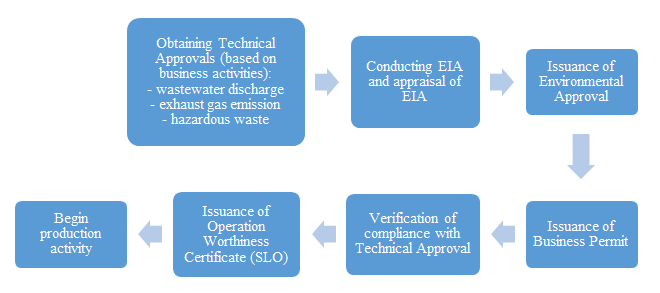The most significant change made by the enactment of the Law No. 11 of 2020 is the simplification of the process to give permits to business entities. The Law has integrated all separate permission schemes into one, which issues the “Business Permit.” Existing Environmental Permits and related sectoral permits (e.g permits for discharge of wastewater, exaust gas hazardous waste, etc) have been integrated into the “Environmental Approval,” which is one of the requirements to obtain the Business Permit. Issuance of an Environmental Approval is regulated by Chapter 2 of the Governmental Regulation No. 22 of 2021. The general procedures for permit under the new integrated system is as shown by the graphic below.

- Obtaining Technical Approvals (based on business activities):
- wastewater discharge
- exhaust gas emission
- hazardous waste
- Conducting EIA and appraisal of EIA
- Issuance of Environmental Approval
- Issuance of Business Permit
- Verification of compliance with Technical Approval
- Issuance of Operation Worthiness Certificate (SLO)
- Begin production activity
The application for Technical Approval shall be submitted via the Environmental Information System. First, whether the application satisfies administrative requirements is checked. If the all requirements are satisfied, then an official examines substantial matters of the application. If there is any error, the application will be return to the business operator for correction. If the examination concludes that the business activity fullfils the technical standards, then Technical Approval is issued. If not, the official will issue a rejection letter with the reason of rejection. Business entities shall obtain Technical Approval for each of their business activities covered by this regulation (e.g., Technical Approval for discharging wastewater, Technical Approval for emitting exhaust gas, etc.). These Technical Approvals are issued by the Ministry, Governor or Regent/City Mayor based on their respective authority.
Before starting the operation, the Ministry, Governor or Regent/City Mayor shall verify the Technical Approvals that have been issued. This verification is to ensure the conformity of the infrastructure and/or facilities that are built on the business site with the corresponding technical approvals and to ensure that facilities and infrastructure works properly to fullfil the emission standards and/or hazardous waste management standards.
If the verification concludes that the conditions imposed by the corresponding Technical Approval are fulfilled, then the Ministry, Governor, or Regent/City Mayor issues Operational Feasibility Certificate/Certificate of Operation Worthiness (SLO). Standards on labor resources shall be fulfilled within one year after a SLO is issued. If the verification concludes that Technical Approval has not been fulfilled, business entities must take improving measures on the infrastructure and faciltities based on the notice of verification result. The production may not start before obtaining SLO, even if the business operator already obtained Business Permit.
Government Regulation No. 22 of 2021 on Environmental Protection and Management:
- General overview
- Overview of Environmental Approval Mechanism
- Summary of Chapter 7 of the Govenrmental Regulation No. 22 of 2021: Management of B3 Waste and Non-B3 Waste (Articles 274 – 470)
- Summary of Chapter 4 of the Govenrmental Regulation No. 22 of 2021: Protection and Management of Air Quality (Articles 163-219)
- Summary of Chapter 3 of the Govenrmental Regulation No. 22 of 2021 : Protection and Management of Water Quality (Articles 107 – 162)
- Obligations of Taking Countermeasure against Pollution and Environmental Restoration under the Govenrmental Regulation No. 22 of 2021
 Overview of Environmental Approval Mechanism under the Govenrmental Regulation No. 22 of 2021
Overview of Environmental Approval Mechanism under the Govenrmental Regulation No. 22 of 2021
























